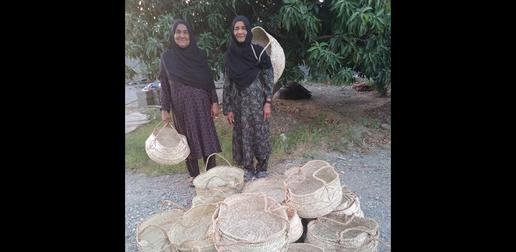The village of Dehkahan and the wider region have built up a reputation over the last decade. It is known not for its extensive palm groves and large citrus orchards, nor for its vast plains and impressive hills favored by climbers, but instead, for its library.
At one time, Dehkahan, which means “old village,” was known as Baghshahr or Garden City. Located 40 km south of the city of Kahnooj and 380 km from the center of Kerman province, it has attracted attention because of the villagers’ devotion to this cherished local amenity.
Word has spread about the Library of the Fatemehs, and this is largely because it was started by the people of the village — and named after the first three members of the library, teenage girls all named Fatemeh. It has been equipped with shelves and cupboards thanks to the hard work of the women of Dehkahan. The women wove and sold traditional “bibi” baskets, using the money to buy 15 units to house the books that were donated to the library.
"The founder of this library was Farzad Mirshekari, a neighbor of my parents', who is the same age as us,” says village resident Ali Akbar. “I think he lives in Kerman now. He was one of the few graduates in our village and worked as a teacher in the village school. On the first day, when he raised the idea of establishing a library in the village, many people ridiculed him. I remember they said that the library in our village would have the story of a person who had no bread to eat and ate cabbage to quell his appetite! Almost no one supported him. But he believed in this work, set up the library in an abandoned shop with his own books and a few other books, which his acquaintances sent to him from Tehran.
"I think it was in 2010 that the library was opened and for a year it had only three members, three teenage girls, all three named Fatemeh. They really loved books. In the village, everything happens by word of mouth, and this method of informing people is always the most effective. The love these children have for books and reading and Farzad's great work made this happen. In 2014, our village became known globally because of this library. It was highlighted by UNICEF as a book-loving village and now has 500 members and a huge amount of books.”
Dehkahan is also well known for citrus, and especially the sweet oranges that grow there. The majority of the villagers work in agriculture and gardening, but the droughts of the last 20 years have had a severe impact on their livelihoods. As a result, large number of villagers have been forced to move to Bandar Abbas and other cities in the region. The population of Dehkahan is now about 4,000.
Saba, a resident of Kerman, found out about the Library of the Fatemehs online and has traveled to Dehkahan several times to help furnish and equip it. "This library has managed to delight all the women in the village. They weaved and sold wicker baskets to buy bookshelves and cupboards, and paid for the cupboards with a portion of the proceeds from the sale. They were really excited."
The baskets woven by the women of the village are called "bibi baskets” — “bibi” meaning woman or sometimes grandmother — because they are mostly woven by the grandmothers of the village. They teach the craft to their daughters and granddaughters, passing down the tradition.
"The baskets are woven from palm leaves," says Saba. “They are very soft and delicate and they are made in different sizes."
The villagers sell the baskets on Rustatisj, a website that facilitates direct sales without intermediaries. The bibi baskets are priced between 45,000 and 120,000 tomans, with the larger baskets commanding a higher price.
"It was a great thing," Saba says. "The women of the village are really happy to introduce their products to people, and sell them too of course. These baskets are very popular as decorative items for the home as well as being useful products."
Saba says the children of Dehkahan village are more social than other children in the surrounding villages, and it’s because of the library. "The Library of the Fatemehs has become a cultural place. Children become acquainted with literature, poetry, the world of storytelling, painting, and film, all of which influence their social relationships. A beautiful and healthy competition for learning has risen among them and the village is now well known through the library and all the villagers are happy. They say our village is now global. The library has become a kind of cultural hangout for them."
Other articles written by IranWire citizen journalists:
What did Iranians Wish For on New Year's Eve?
Iranian Shoppers Distraught as Chicken Becomes a Luxury Item
What Do the Ayatollahs Have Against Nowruz?
Grieving Father: Make 1400 the Year of No to the Islamic Republic
This article was written by citizen journalist in Kerman using the name Soraya Yarahmadi to protect her identity.
visit the accountability section
In this section of Iran Wire, you can contact the officials and launch your campaign for various problems



























comments